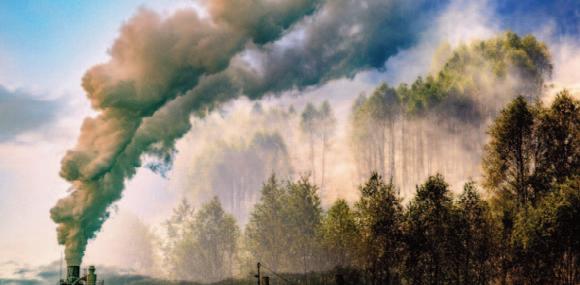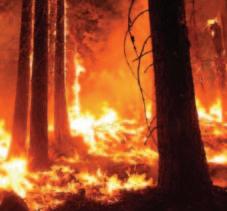
5 minute read
than ever before: sm must go ng impact of rising ocean temperatures
dire. Around 16,000 people in the Republic of Ireland and around 5,000 in the North rely on fisheries for employment, many of them in remote or impoverished coastal communities where other options are limited. Globally, it is estimated that three billion people depend on the ocean for food, most of them in countries in the Global South, reliant on small-scale fisheries threatened by both climate change and overfishing. Marine biodiversity loss is thus a huge threat to food security and job security, and as always it is the poorest in society who must bear the brunt of the destruction. In the warming of the ocean, we see how capitalism is severing the intricate connections between living organisms, connections that produce the air we breath and the food we eat, and that keep the earth’s climate stable.
Extinction – what’s causing the biodiversity crisis?
By Cathal Curran
A LOT of coverage of the climate crisis presents it as being solely a problem with levels of greenhouse gases (GHG) in the atmosphere. On that basis then the only solution is to reduce the amount of GHG we emit, by for example using electric cars, by reducing cattle farming or by planting more trees to absorb CO2. These are important measures that need to be taken, however they do not address the biodiversity crisis that we find ourselves in, which is arguably as profound a disaster as rising CO2 levels.
For if the continued extraction from and degradation of nature continues unabated, even if CO2 and methane were replaced with harmless gases, we’d still plunge ever deeper into a biodiversity ecocide, affecting all life on Earth. We would still be facing empty oceans, bare forests and an apocalyptic level extinction event for many wild animals.

The metabolic rift
The metabolic rift was coined by Marx to describe the constant use of topsoil for growing crops with no fallow year or rest period between harvests, which traditionally would’ve allowed the soil to regain its nutrients. This weakens the soil, leaving it unable to produce crops with as high a yield as before. This has led to a vast increase in synthetic fertiliser production and use, which is not only ecologically destructive but also a finite resource, made using phosphorus which at current rates of extraction are expected to last around 80 years!
The use of these fertilisers in the soils creates a metabolic rift, a destruction of the cycles of life that have been finely tuned between nature and humanity from sustainable use for millennia. The nutrient cycle replenishes the soils, allowing plant life to grow from which we get our food, and it is being destroyed for profit.
phibians, 33% of reef-forming corals, 27% of the world’s mammals, 33% of all marine mammals, and 13% of all known bird species; you can be sure that these are conservative estimates.
Wildlife populations have fallen by an average of 69% between 1970 and 2018. The declines have been most severe in Central and South America and the Caribbean, which has seen a 94% drop in the average wildlife population size. Africa has the second largest fall at 66%, which is followed by Asia and the Pacific with 55% and North America at 20%. Europe and Central Asia experienced an 18% fall.
This shows that colonialism has driven the biodiversity crisis worldwide in large part because of the forceful removal and displacement of Indigenous Peoples from their ancestral lands and from their role as stewards that protected nature. Indigenous Peoples have to this day been excluded from meaningful decision-making around conservation and development because the colonial view of nature protection is the only one considered.
Even the latest IPCC report referenced “colonialism”. It acknowledged that it was both an historic and ongoing driver of the climate crisis. “Present development challenges causing high vulnerability are influenced by historical and ongoing patterns of inequity such as colonialism, especially for many Indigenous peoples and local communities”
System change means socialist change

fuel firms continue to push ahead with 195 “carbon bomb” oil and gas projects that would each result in at least a billion tonnes of CO2 emissions over their lifetimes. Our planet is not dying, it is being killed.
Marine tipping point
Scientists have warned that rising ocean temperatures are devastating for the ocean’s biodiversity, causing mass die-offs of many marine species and further destroying habitats already ravaged by decades of profit-driven overexploitation and pollution. As on land, where wildfires ravage vitally important rainforests, heatwaves in the ocean have the potential to destroy vast swathes of seagrass beds and kelp forests in the seas surrounding Britain and Ireland, ecosystems that draw down vast amounts of carbon and provide habitats for thousands of species. If a tipping point is reached, these ecosystems could start emitting carbon rather than absorbing it, creating a disastrous feedback loop. The implications for fisheries are also

If we want to fight to preserve the living sea and all it provides for us, and alleviate the worst effects of climate change and ecological devastation, we must fight for a different kind of society. It means a democratic socialist society, where production is organised on a sustainable basis, as opposed to the thoroughly destructive pursuit that capitalism is built on.
Democratic planning and the collective public ownership of our planet's resources can meet the needs of all people and for the health of the planet, rather than to line the pockets of fossil fuel magnates and big business generally.
We can apply this to so many of our vital natural systems, The carbon cycle, the water system, our clean air, are all being destroyed, the consequences of which are yet unknown in their totality, however these systems have been calibrated over thousands of years and severing them will absolutely have repercussions in terms of natural disasters, diseases, and food systems.
Mass extinction of animals
The effect on animals is worse. According to the International Union for Conservation of Nature Red List of Threatened Species, more than 41,000 animals worldwide are threatened with extinction. This includes 41% of all am-
We need a mass rewilding effort in Ireland, and worldwide. Vast swathes of land around this country that is now currently used for cattle grazing, which is a very inefficient use of land, could be given over to nature. Of course, this type of land as it does not produce a profit, rather just provides a home to innumerable lifeforms, would be classed as unproductive and contrary to the logic of capitalism and the constant need for more growth.
Restoring and extending these vital habitats is a necessity as it will not only help the diverse range of flora and fauna that rely upon them, but also help alleviate flood damage, cleanse our drinking water, sequester carbon and purify our air.
Organising this means bringing fundamental system change, the system in question is capitalism. It is a system built on ruthless exploitation of people and the planet and that has a criminal indifference to our future and well being. We can end the rule of this system and collectively organise to build a socialist society that gives future generations a planet to live on.







